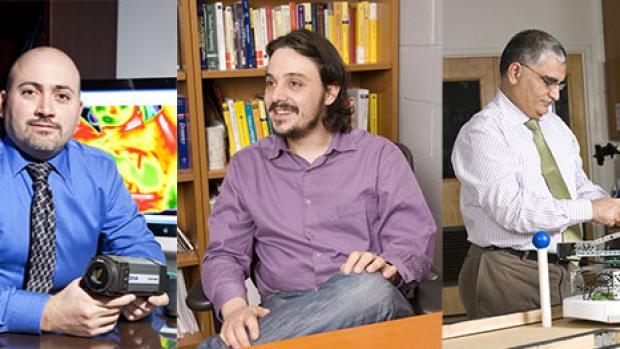A Trio of Prize-Winning Professors

Professors at the NYU Polytechnic School of Engineering have many occasions to feel proud: that moment when a struggling student finally “gets it,” seeing an advisee’s name on a patent or as first author of a well-received paper, watching someone they’ve taught and mentored go on to a rewarding career of their own.
Those occasions are without a doubt immensely gratifying, and most professors would consider them both ample reward and proof of a career well spent. Sometimes, however, receiving formal recognition from peers, monetary prizes, and frame-worthy citations can be the icing on the cake.
The School of Engineering bestows two major prizes on its faculty members: the Distinguished Teacher Award recognizes personal commitment to student learning, exemplary teaching skills, innovative and engaging lesson planning, and accessibility to students both in and out of the classroom, and the Jacobs Excellence in Education Award is given to individuals or groups who have consistently demonstrated educational innovation and excellence by winning grants, presenting at conferences, giving workshops, creating materials used by other educators, and publishing extensively, among other such activities. Each award is decided upon by a nine-person jury comprised of faculty members (themselves former recipients), students (one undergraduate and one graduate), and an alum.
The 2014 recipients of the Jacobs Award—named for the late chemical engineer, alum, and board chair Joseph J. Jacobs—were Professor of Mechanical Engineering Vikram Kapila, whose contributions to K12 STEM Learning have made the School of Engineering an important force in that field and who recently won a $2.6 million National Science Foundation grant for a project that will help middle school science and math teachers use robotics as their curriculum focus, and Professor of Mechanical and Aerospace Engineering Maurizio Porfiri, whose work on biologically inspired robots earned him a place on Popular Science’s 2010 “Brilliant 10” list. Confirming Porfiri’s devotion to educational excellence is the fact that the magazine’s 2014 list included Nicole Abaid, a former student of his; it was one of the few times in the history of the list that a “Brilliant” had been taught by another “Brilliant.”
Kapila feels that the award honors not only the recipients themselves but the entire community of scholars that continues to be created at the School of Engineering. “It is a privilege for me to be a faculty member here,” he says. “It is a blessing to have wonderful colleagues and passionate students who expand my own knowledge horizon every day. Supportive and collaborative colleagues have allowed me to formulate new engineering and STEM education programs through which I get opportunities to recruit and mentor students in my Mechatronics and Control Lab. And as my students’ inquisitive minds offer new perspectives and discover novel solutions to engineering problems, I also learn.”
The 2014 Distinguished Teaching Award went to Matthew Campisi, who says, “My passion has always been in the classroom; I’m always trying to inspire students to embrace engineering and the process of solving real problems. It feels tremendous when I enable them to succeed.” That he has, indeed, greatly inspired his students and enabled them to succeed is evidenced by just how many supported his nomination for the award. They inundated the prize jury with testimonials, many of which referred to him as the best teacher they had ever had. Many mentioned that his courses on signals and systems and on circuits were among the most informative college classes of any type they had ever taken. Also frequently cited were Campisi’s practice of relating every concept he teaches to a real-world situation and his habit of remaining for office hours until each and every student waiting in line had been seen—no matter that the line was often serpentine and that many students needed to speak at length.
“The day he agreed to have me on his research team is one of the most treasured moments of my life,” one student wrote, while another asserted, “He is a living example of how a passionate and prolific engineer can make a difference in the world.” Those sentiments might seem like hyperbole until you consider the ethos to which Campisi has consistently adhered, every minute of his teaching career. “I can’t recall a single instance in which he entered a classroom without that spark in his eye,” one student wrote. “It was a spark that told you, ‘Today, you’re going to learn something amazing.'”




